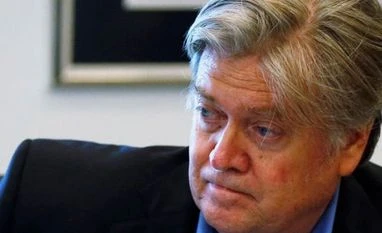The departure of Bannon, the chief executive of Trump's presidential campaign and an architect of his election victory, removes a champion of conservative populism from the administration The former chairman of Breitbart News, Bannon served as a link to the so-called "alt-right" movement attuned to the attitudes and opinions of the president's base.
Bannon's departure was agreed on mutually with White House Chief of Staff John Kelly and his last day on the job will be Friday, White House press secretary Sarah Sanders said. He leaves as the president is engulfed in controversy over remarks on violence in Virginia that appeared to confer legitimacy on white supremacists.
Bannon, whose relationship with Trump was forged through campaign battles, has been one of the president's closest advisers, skilled at infighting and cultivating the media. His departure would strengthen Kelly, who has sought to better organise a West Wing known for chaos and disorder.
The move also will bolster Bannon's rivals within the administration, including National Security Adviser H R McMaster and top economic aide Gary Cohn, with whom Bannon frequently clashed over policy. During an interview Sunday with NBC News, McMaster pointedly and repeatedly refused to say whether he could effectively work with Bannon going forward.
The American Prospect, a progressive magazine, on Wednesday published an interview with Bannon in which the president's chief strategist discussed his efforts to undermine fellow Trump aides and seemed to undercut the president on key foreign policy issues.
Bannon told the magazine political opponents at the State Department and Pentagon were "wetting themselves" over his plans to root out employees he disagreed with over policy. And despite the president's threats of a swift military response to provocations from North Korea, Bannon conceded "there's no military solution here" that wouldn't result in millions of deaths.
Even before the interview, the president signaled Bannon's fate could be in jeopardy. Asked about Bannon's job security during a freewheeling press conference Tuesday at Trump Tower in New York, the president was noncommittal. He said Bannon was "not a racist" and was treated unfairly by the press, but contended he "came on very late" to his presidential campaign.
The president was reportedly upset by Bannon's portrayal as key to his success in a recent book by Bloomberg Businessweek reporter Joshua Green, as well as perceptions that his senior aide was behind leaks to the media.
Anthony Scaramucci, the former White House communications director who was fired last month after less than two weeks on the job, said repeatedly earlier this week he believed Bannon was a leaker.
Still, there were indications in recent days that Bannon was continuing to exert influence in the White House.
Bannon has advocated the president delve into racial issues and applauded Trump's widely panned handling of the Charlottesville situation. The president appeared to press forward with the strategy with a series of tweets Thursday morning decrying the removal of Confederate statues. Trump also recently signed an executive memorandum, championed by Bannon, beginning the process of investigating China for intellectual property theft.
To read the full story, Subscribe Now at just Rs 249 a month
Already a subscriber? Log in
Subscribe To BS Premium
₹249
Renews automatically
₹1699₹1999
Opt for auto renewal and save Rs. 300 Renews automatically
₹1999
What you get on BS Premium?
-
Unlock 30+ premium stories daily hand-picked by our editors, across devices on browser and app.
-
Pick your 5 favourite companies, get a daily email with all news updates on them.
Full access to our intuitive epaper - clip, save, share articles from any device; newspaper archives from 2006.
Preferential invites to Business Standard events.
Curated newsletters on markets, personal finance, policy & politics, start-ups, technology, and more.
Need More Information - write to us at assist@bsmail.in
)